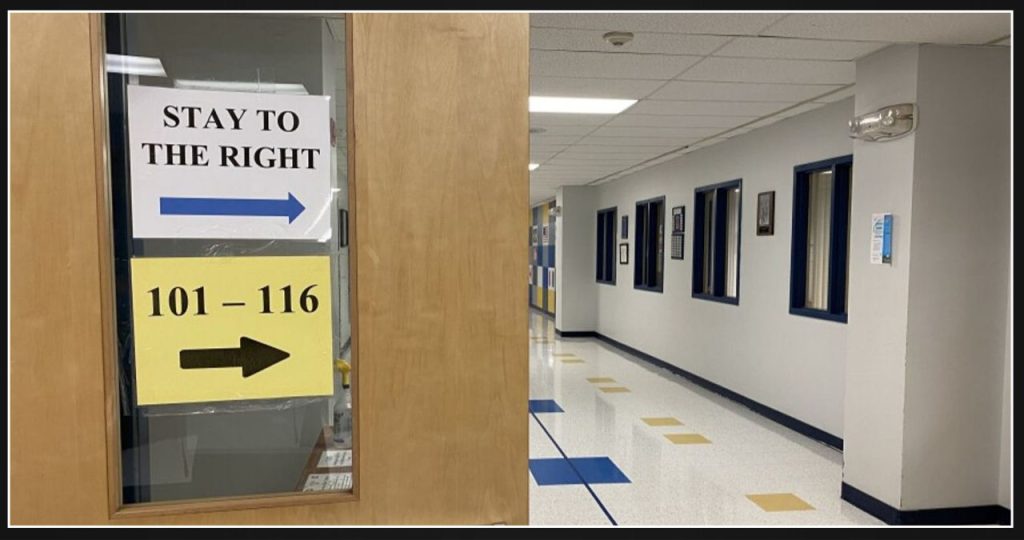New Hampshire public schools are not accustomed to housing migrants. However, if there were any plans to change this, schools that did so would face the consequence of losing their public funding, as proposed by legislation supported by Republicans.
According to Rep. Juliet Harvey-Bolia, the main sponsor of House Bill 71, her goal is to avoid the shutdown of schools being used as temporary shelters for immigrants, including refugees and those who are legally residing here.
Harvey-Bolia of Tilton highlighted that the objective of the bill is not to completely prohibit the use of schools for immigrant housing. Rather, it emphasizes that if entities receive state funding, they should adhere to the agreement of utilizing schools solely for educational purposes. The ultimate goal is to ensure that schools remain dedicated to their primary function of providing education.
According to the Department of Health and Human Services, the legislation may have consequences for individuals who are legally residing in the country, including refugees. The agency has cautioned that the bill could potentially clash with the federal refugee resettlement program and result in a financial burden of up to $18 million per year for the state to support these new arrivals.
The department did not respond to a message requesting further information. Harvey-Bolia mentioned that she was unaware of the agency’s concern.
But there would be an exception in her bill for temporary stays during weather emergencies. Harvey-Bolia cited the example of New York City, which used a school in January to provide temporary housing for migrants who were legally in the country. The city made this decision due to a storm, and the school was utilized for 12 hours. Although classes were not canceled, they were held remotely for a day to accommodate the migrants.
Lawmakers have filed several immigration-related bills for the 2025 session. Among them, there is a legislation that aims to invalidate out-of-state driver licenses issued to undocumented immigrants. Additionally, another bill proposes to require local law enforcement to enhance their cooperation with federal immigration agents.
An organization that assists in resettling 90 to 170 refugees in New Hampshire each year is concerned about the attention being given to undocumented migrants, both at a local and national level. The process of admitting refugees involves a thorough vetting process that can take up to two years. This process includes health and criminal background checks. The majority of refugees settle in Manchester and Nashua, as indicated by DHHS’s tracker.
“Anytime that we have a strong anti-immigrant narrative in the country, it affects all immigrants in the country,” said Bill Gillett, the director of public policy and advocacy for the International Institute of New England “I think all immigrants (get concerned) because they don’t know if they’re going to get caught up in an ICE raid and be improperly detained for any amount of time.”
Gillett is concerned about the well-being of other individuals who have entered the United States through a government program. This includes individuals who have sought asylum and those who are temporarily residing in the country as “parolees” due to the dangerous conditions in their home countries. It’s important to note that being a parolee does not imply a prior conviction. Unfortunately, federal funding for some of these programs has either already ended or is set to expire within the next two years.
Gillett also raised doubts about the necessity of a bill that prohibits immigrants from seeking refuge in public schools, including universities, in New Hampshire.
“This bill seems to be directed at something that hasn’t been an issue and is unlikely to become an issue,” he said.
Gillett said that he dedicated a significant portion of the previous legislative session to engaging in conversations with lawmakers, where he provided them with detailed explanations regarding the intricacies of the country’s immigration programs. He anticipates that this effort will persist throughout the current year.
“We want to make sure that they understand the impact of proposed legislation and that there are certain immigrants that are targeted and certain immigrants that have tended to fall into some of these (anti-immigration bills) unintentionally or intentionally,” he said.
“There’s certainly a focus on undocumented immigrants in the state, rightly or wrongly, and there’s different views on that,” Gillett said. “But extending (legislation) to refugees, asylees, and parolees does not make any logical sense, given that they are lawfully admitted into the country and can obtain or can or come with work authorization.”
